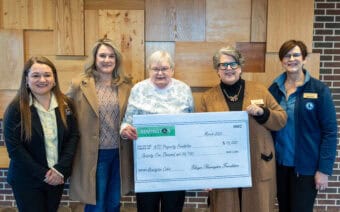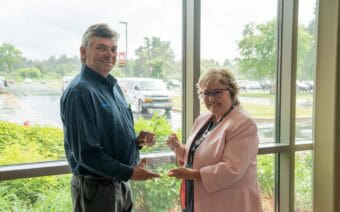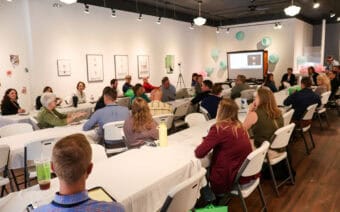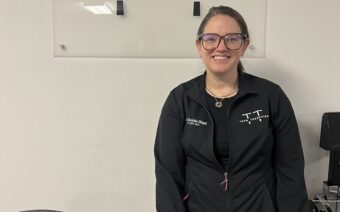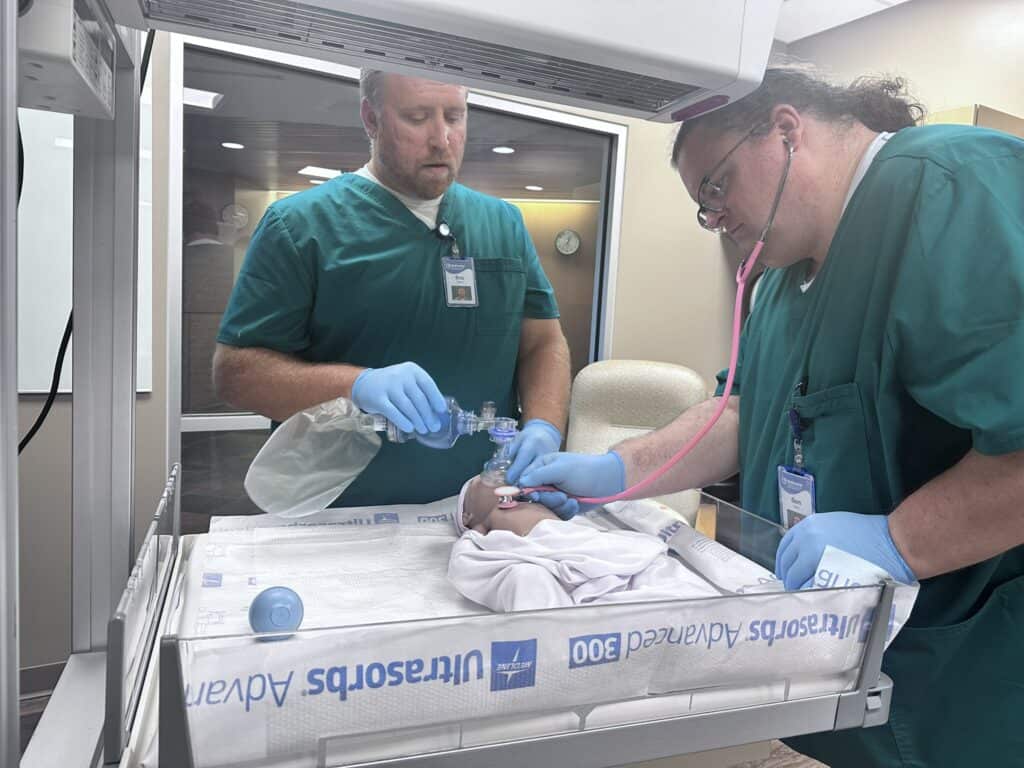
September 2, 2024
WAUSAU – As a higher education institution, Angela Roesler – dean of the school of Health Sciences & Community Services at Northcentral Technical College (NTC) – said there are two key pieces of the college puzzle that must always be kept in mind:
- What’s best for its students
- Making sure it’s meeting the demands of the region’s workforce
That’s why, Roesler said, NTC introduced two new degree programs at the start of the fall 2024 semester: a Respiratory Therapy associate’s degree and a Funeral Services associate’s degree.
“For any new program, we work with our community partners to see what they need, where the workforce is at and maybe what gaps are in the workforce,” she said.
Both programs launched last month.
Respiratory Therapy
The decision to start a Respiratory Therapy (RT) program, Roesler said, came out of a request from local health partners to assess the long-term viability of an RT program.
“When we look at (adding programs, we say), ‘yes, there’s an immediate need, but is there a sustainable need, because of the expense of starting new programs,’” she said. “So, we worked with our local healthcare agencies (to learn more).”
Roesler said NTC also surveyed neighboring districts to see what programs they’re offering to be aware of any possible competing courses.
“That’s just the WTCS (Wisconsin Technical College System) process,” she said.
Once NTC verifies the need – again, in this case, RT – then Roesler said, the next step is to work with the college’s leadership to look at the new program as a whole.
“Where should it live? What’s it going to take to get it started?” she said. “It’s about a two-year process once we get going, because once we’re committed, we then work with accrediting bodies to get the program accredited so students who graduate can take their certification exam.”
Roesler said NTC received provisional accreditation this summer from the Commission on Accreditation for Respiratory Care.
The first cohort of RT students that recently started, she said, will start with some anatomy and physiology classes – “because basically all of our health programs (take) foundational courses of really learning how the human body works.”
Students, Roesler said, will also be able to begin some of their core classes for RT as well.
“The foundations of respiratory therapy classes are what they’ll take this fall,” she said. “There are two classes, and the focus is just learning the respiratory system, what impacts patients who maybe have respiratory complications and learning the very basic assessment and identification of issues,” she said.
Some of the other courses for the program include:
- Respiratory pharmacology, which goes through pharmacology principles, drug dosage and calculations
- Respiratory life support, which focuses on the management of adult ventilatory support
- Respiratory neo/peds care, which delves into neonatal and pediatric respiratory care
All the general courses for the Respiratory Therapy associate’s degree can be completed at any of NTC’s campuses (Wausau, Antigo, Medford, Phillips, Spencer and Wittenberg) or online, but Roesler said all labs for the program need to be completed at the college’s main campus in Wausau where the respiratory lab is located.
“We want to make sure that students who are coming into RT can get some of the classes online if possible, where it’s appropriate, but then also have hands-on (experience),” she said. “RT is obviously a very hands-on, patient-care focused program, so we want to make sure that (students) are on campus and in our RT lab space.”

In total, to receive their associate’s degree, Roesler said RT students must complete 64 credits to graduate.
They must also have a current Basic Life Support CPR certification from the American Heart Association or American Red Cross to start program courses.
According to the U.S. Bureau of Labor Statistics, the estimated wage for a respiratory therapist in Wisconsin is around $38.25 per hour, or $79,110 annually.
Funeral Services
The Funeral Services associate’s degree, Roesler said, will run a bit differently than the RT program – and not just because they lead to different career paths.
The degree program, she said, is in partnership with Milwaukee Area Technical College (MATC), which means students can join the program through either campus, take their general studies classes with NTC and then finish their degree with MATC.
“(Funeral services) has been one that we’ve been monitoring for a while, really looking at the need in the area, and then the viability of the program long-term,” she said.
Students in the funeral services program, Roesler said, can expect to knock out their standard general education classes in their first year, such as English, psychology and sociology.
Then, the core classes, she said, are completed at MATC, which include:
- Funeral service field experience
- Laws, rules and regulations of funeral service
- Embalming theory
- Funeral service science
- Restorative art lab
Roesler said students will need between 66-67 credits to complete the program.
Once students have their associate’s degree, she said they will be eligible to take the National Board exam for funeral directors, which is required for licensure.
On average – according to the U.S. Bureau of Labor Statistics – an embalmer earns about $21.86 per hour in the State of Wisconsin, or $45,480 per year.
Morticians, undertakers and funeral arrangers are estimated to make about $25.83 per hour, or $53,720 annually, on average.
Continually meeting needs
As a community college, Roesler said NTC’s whole existence is based on working with its community partners to meet the region’s workforce needs.
“We want to make sure we’re right at the center of meeting their needs so that students can come here, get their degree and stay here and serve our community,” she said.
Roesler said it’s also important for NTC to be offering classes and programs that students want to take.
“We listen to our students,” she said. “So, if we see an increasing demand, or students calling and asking about programs that raises our awareness that maybe we need to look into something.”
Sometimes, Roesler said, the volume of the demand takes NTC by surprise.
“With RT, I can say specifically that really was our community partners’ demand – it was really a health workforce request,” she said. “What we found out is, once we actually opened (the program) up, we started with a full cohort plus one, because there was that much demand in the community for the program.”
Roesler said the college was “really excited” about the turnout, “because you don’t always start programs full.”
“We actually had 13 qualified students who wanted to start this fall, so we went ahead and opened it up to one more student so that we could get all of the students who were qualified to start right away,” she said.
A new cohort for RT, she said, will begin next year in fall 2025.
When it comes to the Funeral Services program, Roesler said it’s more flexible on NTC’s end when it comes to class size.
“We can serve as many students as we need to serve with gen ed (courses),” she said. “Once they start that second year, then it would be an MATC process for students to get a seat there.”
However, Roesler said it’s important to note that NTC helps connect funeral services students with MATC right away.
“We help connect them with the right people, and help them get all of their paperwork in so that they have a seamless transition,” she said. “We try to make that as easy as possible for our students.”
To learn more, visit ntc.edu.
 Eau Claire middle schooler is state’s queen Civics Bee
Eau Claire middle schooler is state’s queen Civics Bee Brewers games to be ‘much sweeter’ this season
Brewers games to be ‘much sweeter’ this season



